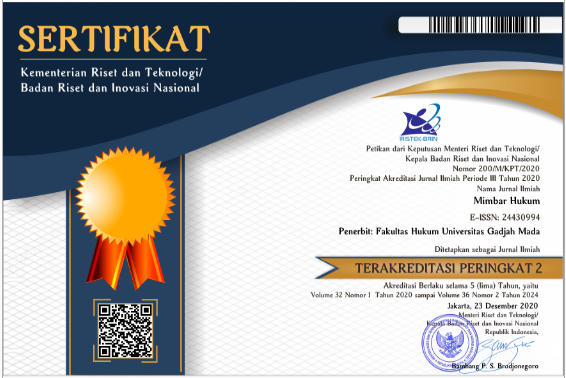Pelajaran dari Konflik Antara Komunitas Sedulur Sikep dan Industri Semen di Jawa Tengah
Joeni Arianto Kurniawan(1*)
(1) Universitas Airlangga Fakultas Hukum
(*) Corresponding Author
Abstract
Abstract:
Depicting the development of the adat law teaching in current days results in a quite unhappy situation, where there is a huge gap between what taught in the classrooms of the law schools in Indonesia and what happens in the reality. The cause of such situation is because there has not been any contemporary comprehensive research on adat laws of Indonesia today in one hand, and also the legal politics implemented by the state which leads the legal system to be more and more state-centered on the other hand. However, though there is an urgent need to overhaul the subject of adat law, in some areas, such as in tenurial matters, some principles of adat law still play a strong role for the interest of the adat communities (masyarakat adat) to defend their tenurial rights. One of the examples of this situation is what I found during my research on a traditional community called Sedulur Sikep in Pati, Central Java, who actively resists the cement industry planned to be established in the area of Kendeng mountain. There are some traditional principles that lie behind such resistance, in which one of them is that this community perceives the Kendeng mountain as “their mother”. This principle is actually the principle of adat land law. Thus, if such principles of adat law are understood and regarded well by the state officials as well as by the private actors, land conflict and land grabbing which are frequently suffered by adat communities in Indonesia should be able to be prevented. In order to be so, there must be a significant paradigmatic change both in the realm of legal policy and also in the realm of legal education.
Intisari
Perkembangan studi hukum adat hari ini berada pada situasi yang tidak menggembirakan, sebab telah ada jurang perbedaan yang lebar antara apa yang diajarkan di kelas di fakultas-fakultas hukum di Indonesia dengan apa yang terjadi di lapangan. Penyebab terjadinya hal ini adalah karena ketiadaan riset-riset kontemporer yang komprehensif dalam bidang hukum adat di Indonesia hari ini di satu sisi, serta adanya politik hukum yang diterapkan negara yang menjadikan sistem hukum yang ada kian bersifat sentralistis pada sisi yang lain. Namun demikian, terlepas dari adanya kebutuhan untuk diadakannya perombakan besar-besaran atas mata kuliah hukum adat, dalam beberapa hal, seperti dalam isu hak tenurial, beberapa prinsip hukum adat masih memegang peranan penting bagi kepentingan masyarakat adat dalam upaya mempertahankan hak-hak tenurial mereka. Salah satu contohnya adalah apa yang telah ditemukan dalam penelitian penulis terhadap komunitas tradisional “Sedulur Sikep” di Pati, Jawa Tengah, yang secara aktif melakukan perlawanan terhadap pendirian industri semen di Pegunungan Kendeng. Hasil penelitian saya menemukan adanya prinsip-prinsip tradisional yang berada di balik aktivitas perlawanan tersebut, salah satunya adalah keyakinan komunitas ini bahwa Pegunungan Kendeng adalah layaknya “ibu” bagi mereka. Prinsip ini sesungguhnya adalah salah satu prinsip dasar hukum adat tentang tanah. Oleh karena itu, jika prinsip sebagaimana demikian dipahami dan dihormati secara sungguh-sungguh oleh semua aktor yang terlibat, baik itu aparat pemerintah maupun para pengusaha, konflik tanah dan perampasan lahan yang sering dialami oleh masyarakat adat di Indonesia seharusnya bisa dicegah. Untuk itu, maka harus ada perubahan paradigma yang signifikan baik di sektor kebijakan hukum dan juga di sektor pendidikan hukum yang ada selama ini.
Keywords
Full Text:
PDFReferences
DAFTAR PUSTAKA
A. BukuHolleman, J, 1981, Van Vollenhoven on Indonesian Adat Law, Martinus Nijhoff, The Hague.
Koesnoe, M., 2000, Prinsip-Prinsip Hukum Adat tentang Tanah, Ubhara Press, Surabaya.
Menski, W., 2006, Comparative Law in Global Context, Cambridge University Press, Cambridge.
Menski, W., 2008, Accommodating Religious Needs in Relation to Marriage: Flying Kites and Navigating State Law and Other Forms of Law, Facolta di Giurisprudenza, Universita degli Studi dell’Insubria, Como.
Menski, W., 2014, Remembering and Applying Legal Pluralism: Law as Kite Flying. In S. P. Donland, & L. H. Urscheler, Concept of Law. Comparative, Jurisprudential, and Social Science Perspective, Routledge, London and New York. hlm. 117-136
Simarmata, R. (2006). Pengakuan Hukum terhadap Masyarakat Adat di Indonesia. Jakarta: UNDP.
Sudiyat, I., 1981, Hukum Adat Sketsa Asas, Liberty, Yogyakarta.
Wignjodipuro, S., 1979, Pengantar dan Asas-Asas Hukum Adat, Alumni, Bandung.
Wignjosoebroto, S, 1994, Dari Hukum Kolonial ke Hukum Nasional, Radja Grafindo Persada, Jakarta.
B. Jurnal
Benda, H. J., & Castles, L., "The Samin Movement", Brijdragen tot de Taal-, Land Volkenkunde, Volume 125, Nomor 2, 1969.
Benda-Beckmann, F. a. , "The Social Life of Living law in Indonesia", In M. Hertogh, 2009, Living Law. Reconsidering Eugen Ehrlich , Hart Publishing, Oxford and Portland Oregon.
Griffits, J., What is Legal Pluralism, Journal of Legal Pluralism and Unofficial Law, Number 24, 1986.
Hertogh, M. , "From 'Men of Files' to 'Men of the Senses': A Brief Characterisation of Eugen Ehrlich's Sociology of Law", In M. Hertogh, 2009, Living Law. Reconsidering Eugen Ehrlich, Hart Publishing, Oxford and Portland Oregon.
Kurniawan, J. A., "Contested Land, Contesting Laws. A Context of Legal Pluralism and Industrialization in Indonesia", Sortuz; Oñati Journal of Emergent Socio-Legal Studies, Volume 6, Issue 2, 2014.
C. Internet
Humas Sekretariat Kabinet Republik Indonesia, "Serahkan 9 Surat Pengakuan Hutan Adat, Presiden Jokowi: Pertahankan Fungsi Konservasi, Jangan Diperjualbelikan", http://setkab.go.id/serahkan-9-surat-pengakuan-hutan-adat-presiden-jokowi-pertahankan-fungsi-konservasi-jangan-diperjualbelikan/.
Fakultas Hukum Universitas Indonesia, "Sejarah dan Perkembangan Fakultas Hukum UI", http://law.ui.ac.id/v3/sejarah-dan-perkembangan/.
D. Putusan Pengadilan
Putusan Mahkamah Konstitusi Nomor 31/PUU-V/2007 perihal Pengujian Undang-Undang Nomor 31 Tahun 2007 tentang Pembentukan Kota Tual di Propinsi Maluku terhadap Undang-Undang Dasar Negara Republik Indonesia Tahun 1945, 18 Juni 2008.
Article Metrics
Refbacks
- There are currently no refbacks.
Copyright (c) 2018 Joeni Arianto Kurniawan

This work is licensed under a Creative Commons Attribution 4.0 International License.




